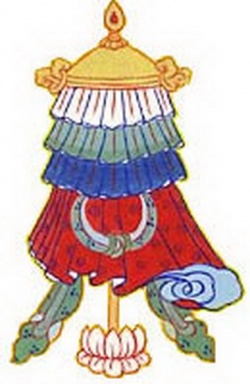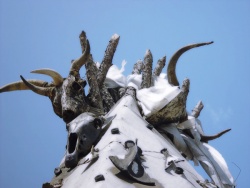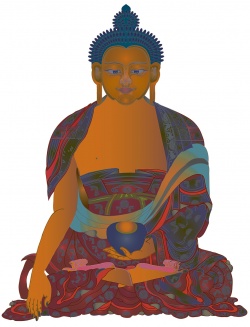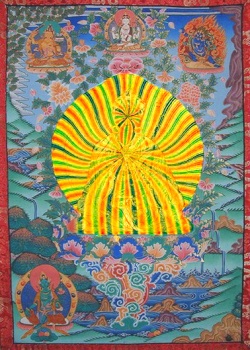Difference between revisions of "Jotiya"
(Created page with "Jotika, Jotiya 1. Jotika, Jotiya. -A treasurer of Rājagaha who later became an arahant. In the {{Wiki|past}} he had been a householder of Benar...") |
|||
| Line 1: | Line 1: | ||
| + | <nomobile>{{DisplayImages|3539|3363|788|805|130|3110}}</nomobile> | ||
| + | |||
| + | |||
| + | |||
| + | |||
| + | |||
[[Jotika]], [[Jotiya]] | [[Jotika]], [[Jotiya]] | ||
| − | 1. [[Jotika]], [[Jotiya]]. -A treasurer of [[Rājagaha]] who later became an [[arahant]]. In the {{Wiki|past}} he had been a [[householder]] of [[Benares]] who, with his elder brother, owned a field of sugar-cane. One day, when returning from the field with some stalks of sugar-cane, he saw a [[Pacceka Buddha]] from [[Gandhamādana]] to whom he gave a [[bowl]] full of sugar-cane juice for him to drink, and when he had drunk it, gave him another bowlful which the [[Pacceka Buddha]] took to [[Gandhamādana]] to share with his [[colleagues]]. The [[householder]], when proffering his gifts, wished for glory and for [[Nibbāna]]. His elder brother, hearing of this, was likewise filled with [[joy]] and he, too, wished for [[Nibbāna]]. | + | 1. [[Jotika]], [[Jotiya]]. -A treasurer of [[Rājagaha]] who later became an [[arahant]]. In the {{Wiki|past}} he had been a [[householder]] of [[Benares]] who, with his elder brother, owned a field of sugar-cane. |
| + | |||
| + | One day, when returning from the field with some stalks of sugar-cane, he saw a [[Pacceka Buddha]] from [[Gandhamādana]] to whom he gave a [[bowl]] full of sugar-cane juice for him to drink, | ||
| + | |||
| + | and when he had drunk it, gave him another bowlful which the [[Pacceka Buddha]] took to [[Gandhamādana]] to share with his [[colleagues]]. | ||
| + | |||
| + | The [[householder]], when proffering his gifts, wished for glory and for [[Nibbāna]]. | ||
| + | |||
| + | His elder brother, hearing of this, was likewise filled with [[joy]] and he, too, wished for [[Nibbāna]]. | ||
| + | |||
| + | In the time of [[Vipassī Buddha]] they were again brothers in a rich [[family]] of [[Bandhumatī]], the elder being called [[Sena]] and the younger [[Aparājita]]. [[Sena]] entered the Order and became an [[arahant]]. | ||
| + | |||
| + | At his suggestion, Aparāijita (According to DhA.iii.364, both uncle and nephew were called Avaroja) built for the [[Buddha]] a very costly [[Gandhakuti]], with the seven kinds of [[precious]] things. | ||
| + | |||
| + | His nephew, also called [[Aparājita]], built an [[elephant]] {{Wiki|stable}} in front of the [[Gandhakuti]] and was [[reborn]] in this age as [[Mendaka]]. | ||
| + | |||
| + | The [[Gandhakuti]] and its surroundings contained all kinds of luxuries and splendours beyond description. (For details see DhA.iv.203f). | ||
| + | |||
| + | Within and without the chamber he [[caused]] [[jewels]], pounded and otherwise, to be strewn knee deep. | ||
| + | |||
| + | Those who came to listen to the [[Buddha]] went away, their hands full of [[jewels]]. One day a [[brahmin]] tried to carry away a very costly [[jewel]], which much annoyed [[Aparàjita]]. | ||
| + | |||
| + | On mentioning it to the [[Buddha]], the [[Buddha]] [[taught]] him to make a wish that his property should not be taken away by thieves or lost by [[fire]] or [[water]]. | ||
| + | |||
| + | For nine months [[Aparājita]] held the {{Wiki|ceremony}} of [[dedication]] of the [[Gandhakuti]]. | ||
| + | |||
| + | In this age he was born as the son of a [[setthi]] in [[Rājagaha]]. On the day of his [[birth]] the whole city became one blaze of {{Wiki|light}}, hence his [[name]], [[Jotika]]. | ||
| + | |||
| + | The [[king]], [[Bimbisāra]], gave one thousand a day for his milk-money. | ||
| + | |||
| + | When the time came for his [[marriage]], [[Sakka]] provided for him a palace, seven storeys high, made entirely of [[precious]] {{Wiki|minerals}}. | ||
| + | |||
| + | Four urns of [[treasure]] stood at the four corners and four stalks of sugar-cane made of solid {{Wiki|gold}}, each the size of a [[palmyra tree]] with leaves of [[precious]] stones, to remind [[Jotika]] of his good [[deed]] in the {{Wiki|past}}. | ||
| + | |||
| + | Seven [[Yakkhas]] guarded the seven gates - [[Yamakolī]], [[Uppala]], [[Vajira]], [[Vajirabāhu]], [[Kasakanda]], [[Katattha]] and [[Disāpāmukha]] - each with numerous followers. | ||
| + | |||
| + | [[Bimbisāra]], hearing of his [[splendour]], appointed [[Jotika]] to the rank of [[setthi]]. | ||
| + | |||
| + | The [[gods]] brought him a wife from [[Uttarakuru]] and lodged her in an apartment in [[Jotika's]] palace. | ||
| + | |||
| + | Her [[name]] was [[Satulakāyī]] (DhA.iv.223). She brought with her a pint-pot of {{Wiki|rice}} and three {{Wiki|crystal}} fire-stones. | ||
| + | |||
| + | Whenever they wished to eat, they would put {{Wiki|rice}} over the boiler and set it over the crystals. The stones would immediately become alight and, when the meal was cooked, would extinguish themselves. | ||
| + | |||
| + | The pot was inexhaustible. | ||
| + | |||
| + | All who came to visit [[Jotika]] were provided with [[food]] and were allowed to take anything they wished from the [[treasure]], the [[treasure]] never growing less. So great were the crowds which flocked to Jotika's palace that for a long time [[Bimbisāra]] had no chance of [[seeing]] it. | ||
| + | |||
| + | When [[Bimbisāra]] did in the end visit him with [[Ajātasattu]], [[Jotika]] invited him to a meal which was the most dainty the [[king]] had ever tasted. | ||
| + | |||
| + | After the meal [[Jotika]] presented his wife to [[Bimbisāra]]; so delicately was she nurtured that the [[perfume]] with which the [[king]] was scented {{Wiki|hurt}} her [[eyes]]! | ||
| + | |||
| + | There were no lamps in Jotika's house; only the {{Wiki|light}} of [[jewels]] was made use of, and as a memento of [[Bimbisāra's]] visit [[Jotika]] gave him a huge [[jewel]] to be used as a [[lamp]]. | ||
| + | |||
| + | (This account is taken from DhA.iv.199-213). | ||
| + | |||
| + | |||
| + | [[Jotika]] was a very pious follower of the [[Buddha]]. Once, when he was away listening to the [[Buddha's]] preaching, | ||
| + | |||
| + | [[Ajātasattu]] - who even when visiting the palace as a boy with his father had coveted Jotika's [[wealth]] - went with his soldiers to attack the palace in an attempt to take possession of it. | ||
| + | |||
| + | But the [[Yakkha]] [[Yamakolī]] routed the {{Wiki|army}}, and [[Ajātasattu]] fled for [[refuge]] to the [[vihāra]] where [[Jotika]] was listening to the [[Dhamma]]. | ||
| + | |||
| + | On being charged by [[Ajātasattu]] with {{Wiki|hypocrisy}} in that he was there listening to the [[Dhamma]], | ||
| + | |||
| + | after having charged his guards to set upon the [[king]], [[Jotika's]] answer was that he had no need of guards since nobody could take anything of his without his sanction. | ||
| + | |||
| + | He then challenged the [[king]] to remove the rings from his (Jotika's) fingers. [[Ajātasattu]], trying with all his might, failed. [[Jotika]] then held out his hands and his rings all fell off. | ||
| − | + | Agitated by the king's [[desire]] to possess his [[wealth]], [[Jotika]] asked for permission to become a [[monk]]. | |
| − | + | [[Ajātasattu]] agreed, hoping thus to get possession of his riches. | |
| − | + | [[Jotika]] entered the Order and soon became an [[arahant]], but at the [[moment]] of his [[attainment]] of [[arahantship]] all his [[wealth]] and [[earthly]] glory vanished and his wife returned to [[Uttarakuru]] (DhA.iv.221-4). | |
| − | [[Jotika]] | + | [[Jotika]] is included among the five persons who possessed great [[merit]] and had [[puññiddhi]]. |
| − | + | DhA.i.385; Vsm.383; PsA.502. These five persons are described as [[amitabhogā]] (AA.i.220). | |
| − | + | 2. [[Jotika]].-A [[householder]] of [[Rājagaha]] and father of [[Dīghāvu]]. | |
| − | + | When [[Dīghāvu]] fell ill he sent [[Jotika]] to tell the [[Buddha]] (S.v.344f). ' | |
{{R}} | {{R}} | ||
http://dictionary.buddhistdoor.com/en/word/9048/jotika,%20jotiya | http://dictionary.buddhistdoor.com/en/word/9048/jotika,%20jotiya | ||
{{PaliTerminology}} | {{PaliTerminology}} | ||
[[Category:]] | [[Category:]] | ||
Revision as of 04:58, 26 March 2016
1. Jotika, Jotiya. -A treasurer of Rājagaha who later became an arahant. In the past he had been a householder of Benares who, with his elder brother, owned a field of sugar-cane.
One day, when returning from the field with some stalks of sugar-cane, he saw a Pacceka Buddha from Gandhamādana to whom he gave a bowl full of sugar-cane juice for him to drink,
and when he had drunk it, gave him another bowlful which the Pacceka Buddha took to Gandhamādana to share with his colleagues.
The householder, when proffering his gifts, wished for glory and for Nibbāna.
His elder brother, hearing of this, was likewise filled with joy and he, too, wished for Nibbāna.
In the time of Vipassī Buddha they were again brothers in a rich family of Bandhumatī, the elder being called Sena and the younger Aparājita. Sena entered the Order and became an arahant.
At his suggestion, Aparāijita (According to DhA.iii.364, both uncle and nephew were called Avaroja) built for the Buddha a very costly Gandhakuti, with the seven kinds of precious things.
His nephew, also called Aparājita, built an elephant stable in front of the Gandhakuti and was reborn in this age as Mendaka.
The Gandhakuti and its surroundings contained all kinds of luxuries and splendours beyond description. (For details see DhA.iv.203f).
Within and without the chamber he caused jewels, pounded and otherwise, to be strewn knee deep.
Those who came to listen to the Buddha went away, their hands full of jewels. One day a brahmin tried to carry away a very costly jewel, which much annoyed Aparàjita.
On mentioning it to the Buddha, the Buddha taught him to make a wish that his property should not be taken away by thieves or lost by fire or water.
For nine months Aparājita held the ceremony of dedication of the Gandhakuti.
In this age he was born as the son of a setthi in Rājagaha. On the day of his birth the whole city became one blaze of light, hence his name, Jotika.
The king, Bimbisāra, gave one thousand a day for his milk-money.
When the time came for his marriage, Sakka provided for him a palace, seven storeys high, made entirely of precious minerals.
Four urns of treasure stood at the four corners and four stalks of sugar-cane made of solid gold, each the size of a palmyra tree with leaves of precious stones, to remind Jotika of his good deed in the past.
Seven Yakkhas guarded the seven gates - Yamakolī, Uppala, Vajira, Vajirabāhu, Kasakanda, Katattha and Disāpāmukha - each with numerous followers.
Bimbisāra, hearing of his splendour, appointed Jotika to the rank of setthi.
The gods brought him a wife from Uttarakuru and lodged her in an apartment in Jotika's palace.
Her name was Satulakāyī (DhA.iv.223). She brought with her a pint-pot of rice and three crystal fire-stones.
Whenever they wished to eat, they would put rice over the boiler and set it over the crystals. The stones would immediately become alight and, when the meal was cooked, would extinguish themselves.
The pot was inexhaustible.
All who came to visit Jotika were provided with food and were allowed to take anything they wished from the treasure, the treasure never growing less. So great were the crowds which flocked to Jotika's palace that for a long time Bimbisāra had no chance of seeing it.
When Bimbisāra did in the end visit him with Ajātasattu, Jotika invited him to a meal which was the most dainty the king had ever tasted.
After the meal Jotika presented his wife to Bimbisāra; so delicately was she nurtured that the perfume with which the king was scented hurt her eyes!
There were no lamps in Jotika's house; only the light of jewels was made use of, and as a memento of Bimbisāra's visit Jotika gave him a huge jewel to be used as a lamp.
(This account is taken from DhA.iv.199-213).
Jotika was a very pious follower of the Buddha. Once, when he was away listening to the Buddha's preaching,
Ajātasattu - who even when visiting the palace as a boy with his father had coveted Jotika's wealth - went with his soldiers to attack the palace in an attempt to take possession of it.
But the Yakkha Yamakolī routed the army, and Ajātasattu fled for refuge to the vihāra where Jotika was listening to the Dhamma.
On being charged by Ajātasattu with hypocrisy in that he was there listening to the Dhamma,
after having charged his guards to set upon the king, Jotika's answer was that he had no need of guards since nobody could take anything of his without his sanction.
He then challenged the king to remove the rings from his (Jotika's) fingers. Ajātasattu, trying with all his might, failed. Jotika then held out his hands and his rings all fell off.
Agitated by the king's desire to possess his wealth, Jotika asked for permission to become a monk.
Ajātasattu agreed, hoping thus to get possession of his riches.
Jotika entered the Order and soon became an arahant, but at the moment of his attainment of arahantship all his wealth and earthly glory vanished and his wife returned to Uttarakuru (DhA.iv.221-4).
Jotika is included among the five persons who possessed great merit and had puññiddhi.
DhA.i.385; Vsm.383; PsA.502. These five persons are described as amitabhogā (AA.i.220).
2. Jotika.-A householder of Rājagaha and father of Dīghāvu.
When Dīghāvu fell ill he sent Jotika to tell the Buddha (S.v.344f). '
Source
http://dictionary.buddhistdoor.com/en/word/9048/jotika,%20jotiya [[Category:]]





